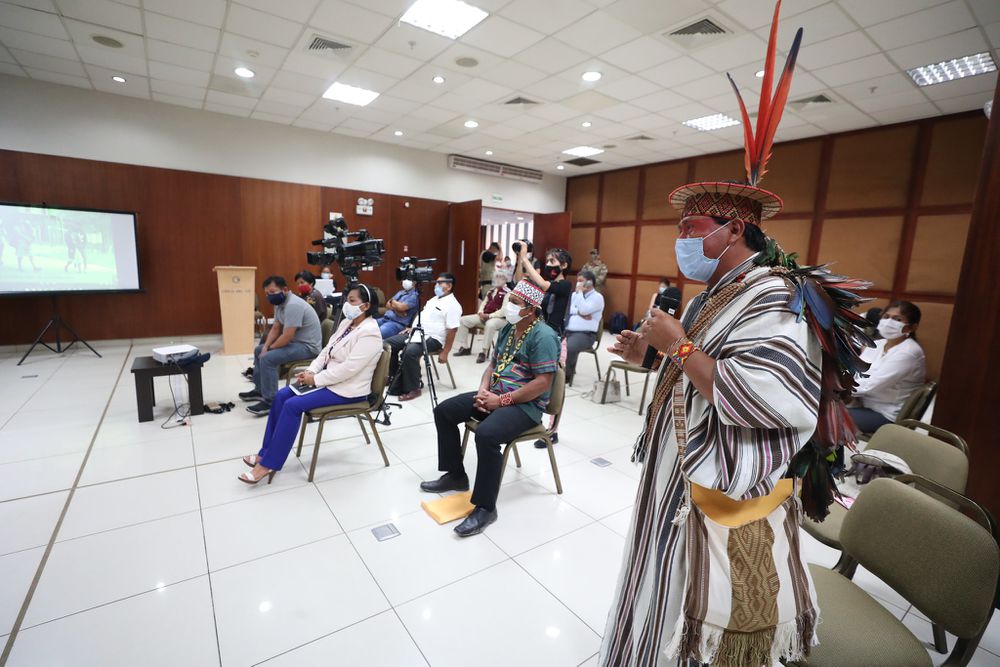RIO DE JANEIRO, BRAZIL – “The government is negligent toward so many things we are experiencing”, denounces Berlin Diques, one of the leaders who in December alerted the government to death threats against indigenous leaders.

Two indigenous leaders of the Cacataibo ethnic group, Herasmo García Grau and Yenes Ríos Bonsano, have been murdered this week in Peru, as denounced this Saturday by the apu (chief) Berlin Diques. This is the latest in a string of murders of indigenous and mixed-race leaders in the Amazonian regions of Ucayali and Huanuco who, in recent years, have denounced invaders who grow coca for drug trafficking and land traffickers.
Diques himself was one of the eight leaders who alerted the Interior and Justice Ministers and the Attorney General’s Office in December that six leaders were under death threats, but received no reply. In that meeting, representatives of the Cacataibo, Ashaninka and Shipibo ethnic groups also reported that 8 indigenous communities were at greater risk: one of them was Sinchi Roca, in Ucayali, of which García Grau, one of those murdered last week, was leader.
“The government is negligent toward so many things we are experiencing. While we abide by the government’s measures due to the pandemic, these illegals continue to push their ambitions into territories of tenured communities and others that are not tenured due to problems in the Ministry of Agriculture [which issues land titles]. The latter are more likely to remain under threat,” the leader lamented.
According to a press release by the Regional Organization Aidesep Ucayali (ORAU), which Diques presides, García Grau, 28 years old, was kidnapped on Thursday in Sinchi Roca. His body was found a day later. According to the leader, on the day of his kidnapping, the indigenous leader was touring the areas “to see if the invaders were still present in those community areas.”
“The authorities care little or nothing. No one paid any attention to our denunciations,” laments the ORAU leader. The community where the kidnapping occurred has requested that their communal deeds be updated, but the Regional Directorate of Agriculture of Ucayali has systematically refused to complete this process, and this contributes to the interests of invaders, traffickers and other criminals who use this area as a transit route for their illegal businesses.”
Meanwhile, Yenes Ríos Bonsano was murdered four days before García Grau, according to preliminary information provided by Diques, but his body could not be recovered until Monday. Ríos Bonsano was a member of the native community of Puerto Nuevo, in the province of Coronel Portillo, about five hours from Pucallpa, capital of the Ucayali region.
The president of ORAU is demanding from the authorities laws that “truly protect collective and territorial rights” in order to stop the advance of drug trafficking. In addition, he requested a multisectoral meeting with officials from several ministries to address the lack of geo-referencing and the existence of drug airstrips. “Everyone is aware and knows this, particularly the police, but there is no action, there is much corruption,” he adds.
According to the Amazon leader, the forestry authority estimates that 42,000 hectares have been deforested on indigenous community lands, mainly because of drug trafficking. Ricardo Pérez, a member of the Amazon Watch team in Peru, says that some of the threatened Amazonian Apus have called for guarantees, but the police only provide them with protection in the cities. “The communities are faced with drug traffickers who want to plant coca, they are in danger every day,” he says.

Impunity installed
In October, at an Inter-American Commission on Human Rights hearing on corruption and violation of the rights of indigenous advocates, a Peruvian NGO lodged four complaints, including one on the Cacataibo community. “In it, it was repeatedly raised that drug trafficking, logging, illegal mining and impunity regarding these crimes result in the murder of leaders,” says Magaly Avila, a sociologist with the NGO Proética.
“In December, given the relentless advance of drug trafficking in Huánuco and Ucayali, we accompanied the indigenous leaders to meet with the ministries and the environmental prosecutor’s office and in the different meetings it was stated that they were going to take action on the matter,” adds the sociologist. “In practice, the government has done little or nothing, despite the Inter-American Commission’s recommendations,” says Avila.
No one has been sanctioned for the crimes against environmental and indigenous advocates in Ucayali. In 2014, Edwin Chota and 3 other leaders of his community were killed by an illegal logging mafia that Chota denounced to the Attorney General’s Office, based on pictures he had taken himself. In April last year, during the pandemic, the mafias murdered Arbildo Meléndez, Cacataibo chief of the indigenous community of Unipacuyacu (on the border of Ucayali with the Huanuco region).
Zulema Guevara, Meléndez’s wife, told the press that the leader began to receive threats when he decided to retake the community’s land tenure process, which had been stalled due to bureaucracy since 1995. The wife and children of the former Unipacuyacu leader were forced to move to Pucallpa, the capital of Ucayali, for protection. Two weeks later, Ashaninka community member Benjamín Ríos was killed in Kipachari, Tahuanía district. An ORAU press release reported at the time that the victim had received death threats and harassment from people linked to drug trafficking and invasions.
Following the murders of Garcia and Rios, Amazonian indigenous organizations fear for the life of apu Herlin Odicio, president of the Native Federation of Cacataibo Communities (FENACOCA), who has also again been threatened.
Since 2011, 220 human rights advocates have been killed and 960 criminalized in Peru according to the report ‘Undermining Rights’, released on Thursday by the Observatory of the World Organization Against Torture and FIDH, and the National Coordinator of Human Rights.
Source: El Pais

